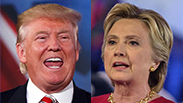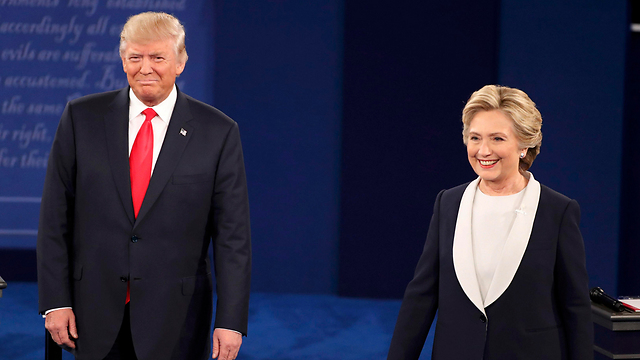
Hillary Clinton and Donald Trump. US Jews facing the unknown
צילום: AFP, AP
Clinton or Trump: The Jewish dilemma
Analysis: Many traditional Jews will vote for Donald Trump despite his image, personality, rhetoric and messages, yet the large Jewish majority will vote for Hillary Clinton because it perceives her Republican rival as dangerous.
WASHINGTON – Even after the latest debate between Hillary Clinton and Donald Trump, there is still a sharp Jewish dilemma in the current US presidential election. On the one hand, how can a Jew identify with such a morally problematic and controversial figure like Trump? On the other hand, how committed are the Jews to the Democratic Party, after many of its leaders and voters have distanced themselves in recent years from the traditional core values of the American center?

For decades, US Jews identified with the liberal center that promised them the status of a minority which shares the American vision and is identified with the American democratic ethos, which was also “attached” to the Israel-US relations. But this ethos has been worn down in recent years among progressive democrats, like Bernie Sanders, who have also moved away from sympathizing with the Jews as a minority.
The conservative right gave the Jews “a safer place.”

On the one hand, how can a Jew identify with such a morally problematic and controversial figure like Trump? On the other hand, how committed are the Jews to the Democratic Party? (Photo: Reuters) (צילום: רויטרס)
In addition, while progressive Democrats ceased to see Israel as a democratic state but rather as an occupying state, the Republicans presented Israel as a spearhead in the battle for worldwide democracy.
In the current elections, Trump represents the perception of returning to tribalism, fear of universalism, a demand for American greatness based on the values of the past and an objection to anti-capitalist social activism. All these are values which Jewish liberals were always afraid of, in addition to their fear of the religious-Christian elements of this perception.
Many of the more religious Jews, the Orthodox and ultra-Orthodox, US Jewry’s fastest growing group, feel secure even against these messages. They are not afraid of the old white anti-Semitism and do not hesitate to define themselves as a separated tribal group. In a meeting with Republican Jews, I was jokingly told by my hosts that the difference between a Reform Jew and Trump is that the latter will at least have Jewish grandchildren.
The Jewish liberals, on the other hand, are caught in a trap. Their communities are growing weaker due to mixed marriages and an erosion of their Jewish ethnic identity. The focus on universal social activism, which they like to refer to as “tikkun olam,” has moved them further away from the tribal Jewish experience. There is a reason why US President Barack Obama used the expression “we are all Jews” to define the American liberal Jewry.
In the upcoming elections in November, many of the “tribal” Jews will vote for Trump although his image, personality, rhetoric and messages are very far off from the American Jewish cultural experience and tradition. They too have essentially moved away from these values and this tradition. Nonetheless, the large Jewish majority is expected to vote for Clinton because it perceives Trump as unexpected and dangerous.
Despite the dramatic changes taking place in the Jewish community and the numerical increase of the more religious forces, most US Jews are concerned that Trump may lead a radical change in direction. They believe that he cannot lead the US in an organized manner and that his term as president may evoke a social unrest which will also affect the economic system. Even Jews in the Democratic center, who are repelled by the progressive voice in the party and do not trust Clinton, will prefer her “conventionalism,”- the expected - even if it is problematic.
Surprisingly, the Israeli issue has almost disappeared in this election. The Democratic camp is avoiding a conflict with the Israeli government at this stage, for fear that the Jewish forces in the center that applauded Trump at the AIPAC conference will take a further step and vote for him. In fact, it is Clinton’s campaign which is stopping the administration right now from advancing an international initiative on the Israeli-Palestinian conflict.
Meanwhile, the US Jewry’s leadership is sitting on the fence and trying not to get caught in the eye of the storm, which is reaching new intolerable lows. The American Jewry, just like all of America, is greatly divided in this election campaign, but its leaders understand very well that they must make an effort to reduce the internal rifts, including concerning the Israeli issue, as they face the unknown.










